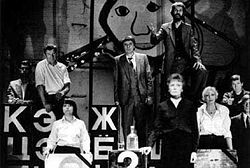
Taganka Theatre
Encyclopedia

Art Nouveau
Art Nouveau is an international philosophy and style of art, architecture and applied art—especially the decorative arts—that were most popular during 1890–1910. The name "Art Nouveau" is French for "new art"...
building on Taganka Square
Taganka Square
Taganka Square or Taganskaya Square is a city square at the south-eastern corner of the Garden Ring in central Moscow, formed in 1963 by merging two historic squares, Upper Taganka and Lower Taganka. In 1813 the district of Taganka was reconstructed by Joseph Bové, who built a market there...
in Moscow. The theatre was founded in 1964 by Yuri Lyubimov
Yuri Lyubimov
Yuri Petrovich Lyubimov is a Soviet and Russian stage actor and director associated with the internationally-renowned Taganka Theatre which he founded ,...
and continued the traditions of his alma mater, the Vakhtangov Theatre, while also exploring the possibilities of Bertolt Brecht
Bertolt Brecht
Bertolt Brecht was a German poet, playwright, and theatre director.An influential theatre practitioner of the 20th century, Brecht made equally significant contributions to dramaturgy and theatrical production, the latter particularly through the seismic impact of the tours undertaken by the...
's "epic theatre
Epic theatre
Epic theatre was a theatrical movement arising in the early to mid-20th century from the theories and practice of a number of theatre practitioners, including Erwin Piscator, Vladimir Mayakovsky, Vsevolod Meyerhold and, most famously, Bertolt Brecht...
".
Under Lyubimov, the theatre rose to popularity in Moscow, with Vladimir Vysotsky
Vladimir Vysotsky
Vladimir Semyonovich Vysotsky was a Soviet singer, songwriter, poet, and actor whose career had an immense and enduring effect on Russian culture. He became widely known for his unique singing style and for his lyrics, which featured social and political commentary in often humorous street...
and Alla Demidova
Alla Demidova
Alla Sergeyevna Demidova is a Russian actress internationally acclaimed for the tragic parts in innovative plays staged by Yuri Lyubimov in the Taganka Theatre. She was awarded the USSR State Prize in 1977.- Biography :...
as the leading actors. Other notable members of Lyubimov's troupe have been Valery Zolotukhin, Veniamin Smekhov
Veniamin Smekhov
Veniamin Borisovich Smekhov is a Soviet and Russian actor and stage director.Smekhov has long worked in the Moscow Taganka Theatre where his roles included Woland in a stage adaptation of Mikhail Bulgakov's The Master and Margarita. In film, he is most known and loved for the role of Athos in a...
, and Leonid Filatov
Leonid Filatov
Leonid Alekseyevich Filatov was a Soviet and Russian actor, director, poet, pamphleteer, who shot to fame while a member of troupe at Taganka Theatre under director Yury Lyubimov...
. Nikolai Erdman
Nikolai Erdman
Nikolay Robertovich Erdman was a Soviet dramatist and screenwriter primarily remembered for his work with Vsevolod Meyerhold in the 1920s. His plays, notably The Suicide , form a link in Russian literary history between the satirical drama of Nikolai Gogol and the post-World War II Theatre of the...
(famous for his work with Vsevolod Meyerhold
Vsevolod Meyerhold
Vsevolod Emilevich Meyerhold was a great Russian and Soviet theatre director, actor and theatrical producer. His provocative experiments dealing with physical being and symbolism in an unconventional theatre setting made him one of the seminal forces in modern international theatre.-Early...
in the 1920s) was responsible for the theatre repertoire. The theatre had been deep in trouble with Soviet authorities, who banned many of Lyubimov's productions, until the director was stripped of his Soviet citizenship and exiled to the West in 1984.
When another outstanding stage director, Anatoly Efros
Anatoly Efros
-Children's Theatre and the Lenkom:Efros was born in Kharkov. In 1954, he was appointed to run the Central Theatre for Children in Moscow and managed to transform it from a conservative backwater into one of the most fashionable Soviet theatres....
, was appointed to run the theatre in Lyubimov's stead, he was boycotted and reviled by leading actors in the foulest terms. After Efros's death three years later, a staunch Communist supporter, Nikolay Gubenko, was nominated to lead the troupe. Lyubimov's return to the theatre in 1989 led to the troupe being split, with Gubenko and his party seceding from Lyubimov's company and forming their own "Community of Taganka Actors" .
In June, 2011 before a performance of Bertolt Brecht
Bertolt Brecht
Bertolt Brecht was a German poet, playwright, and theatre director.An influential theatre practitioner of the 20th century, Brecht made equally significant contributions to dramaturgy and theatrical production, the latter particularly through the seismic impact of the tours undertaken by the...
's play 'The Good Person of Szechwan' in Czech
Czech language
Czech is a West Slavic language with about 12 million native speakers; it is the majority language in the Czech Republic and spoken by Czechs worldwide. The language was known as Bohemian in English until the late 19th century...
, the actors of theatre refused to rehearse unless they were paid first. 93-years old Lyubimov paid the money and left the theatre. "I've had enough of this disgrace, these humiliations, this lack of desire to work, this desire just for money", he told. Two leading actors of theatre, Dmitry Mezhevich
Dmitry Mezhevich
Dmitry Mezhevich is a Soviet and Russian actor and bard.Mezhevich has long worked in the Moscow Taganka Theatre where he played in The Good Person of Szechwan , Hamlet, Woe from Wit, Tartuffe and many other stagings. Mezhevich studied hoboe, then started to play on guitar. He is a known bard in...
and Alla Smirdan, as well as some administrative assistants, followed Lyubimov.

